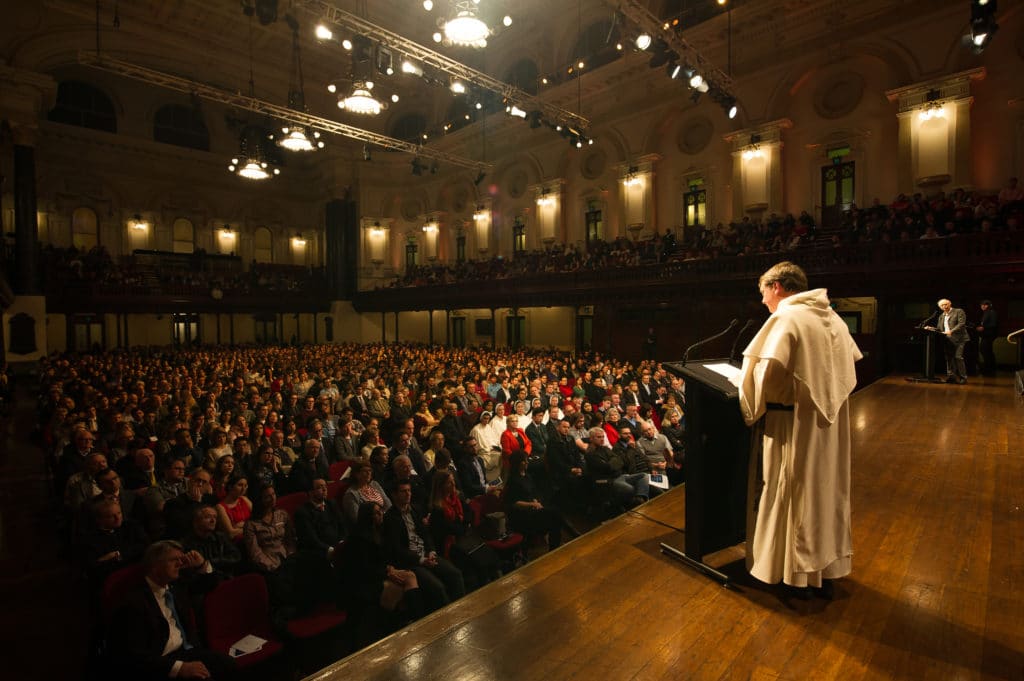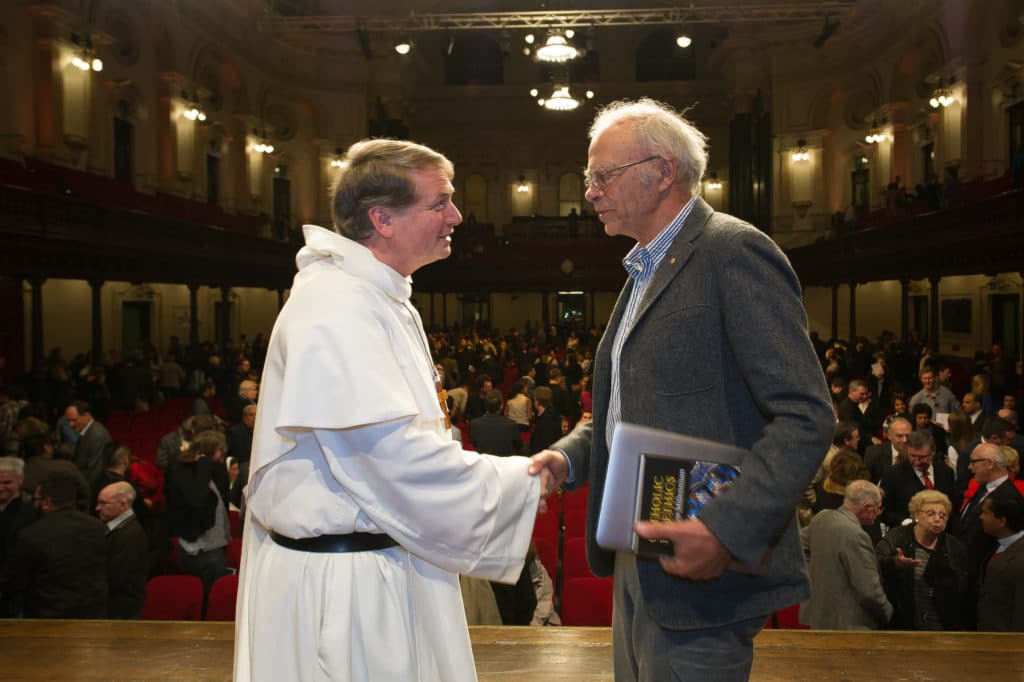A packed Town Hall witnessed a once-in-a-decade event last Thursday night when the Archbishop of Sydney, Archbishop Anthony Fisher OP, debated Princeton Professor of bioethics Peter Singer on whether voluntary euthanasia should be legalised.

ABC religion and ethics editor Scott Stephens opened proceedings at his own, playful expense, saying the tribalism typical on “a certain ABC television show on Monday nights” was about to be eclipsed by the ‘civil’ and ‘deeply humane’ engagement that would ensue.
Neither he nor the audience was left disappointed, with Prof Singer and Archbishop Fisher trading their respective 12-minute arguments and five-minute rebuttals before taking 40 minutes’ worth of questions from the floor in a robust, but never bitter, exchange.
In what the archbishop described as a “generous” gesture, Prof Singer adopted the definition of euthanasia outlined by Archbishop Fisher in his historic 2004 debate with euthanasia advocate Dr Philip Nitschke (“an act or calculated course of omission intended to shorten life with a supposedly merciful motivation”).
https://www.youtube.com/watch?v=kZLs5L_Iknc”]
Prof Singer argued that killing by voluntary euthanasia did not violate the autonomy of a person but respected it, adding that a competent, well-informed adult was “the best judge of whether the quality of their life is still acceptable and, with the informed view of doctors … whether it can be expected to get better or not”.
He said he was not “an absolutist about autonomy” and did not want to make it easy for people to end their lives because of a condition that was otherwise treatable or from which they had a reasonable hope of recovery, such as sadness after a failed romantic relationship.
In his view, there wasn’t much of a moral difference between euthanasia regimes in which doctors provided people with lethal injections, or regimes of physician assisted suicide (PAS) in which doctors provided patients with prescriptions for death inducing drugs.
PAS regimes, particularly in the US, Prof Singer said, had proven that strict conditions could be imposed on euthanasia without it spreading to other vulnerable people and groups.
Archbishop Fisher opened his case by offering two wartime scenarios of fatally wounded men: one who was shot in a mercy killing; and the other, who was held by his brother, reliving many of their childhood memories while drifting in and out of consciousness until death.
“Arguably that second approach puts a higher value on human love and relationships but also is more demanding. It asks more of people,” the archbishop said.
“In Prof Singer’s view of life … its point is fulfilling preferences, whereas on my view of life … it is intrinsically valuable,” the archbishop said. “However reduced our condition, we have a radical dignity from our first breath to our last, and that’s the basis of our equality and our human rights. That’s the reason we protect even the hopeless.”
Real world examples, particularly in Europe, provided ample evidence of what happens when the “logic” of euthanasia is enacted in a society, with euthanasia now not limited to the terminally ill, but extended to the seriously sick, mentally ill, babies and children.
“If relieving suffering is what the euthanasia debate is all about then we have to be honest with ourselves about where that leads,” Archbishop Fisher said.
People already under pressure in a culture which valued efficiency, beauty and productivity above all else, would begin to internalise its logic, eliminating themselves with the aid of the state so as not to be a “burden” on others.
“Euthanasia is sold to the community as being for the extreme cases, for unrelievable pain – especially for the terminally ill – but then it’s extended to those who are chronically sick; those with mental illnesses, those with existential despair. There is bracket creep; it evolves.”

While always civil, the night was not devoid of biting moments.
Prof Singer declined to answer questions outside of what he deemed to be the scope of the debate question: particularly questions about the spread of voluntary euthanasia to involuntary cases.
One such question came from a man with spina bifida myelomeningocele who asked how people in favour of legalising euthanasia could reasonably assess future suffering, referencing the euthanising of babies and infants, including those with spina bifida, in the Netherlands.
But there were also moments of levity. During a testy exchange between Prof Singer and a questioner, Archbishop Fisher calmed the audience’s discomfort by pointing out that the professor’s 1979 book, Practical Ethics, to which the questioner had referred, was now in its third edition and for sale in the foyer.
